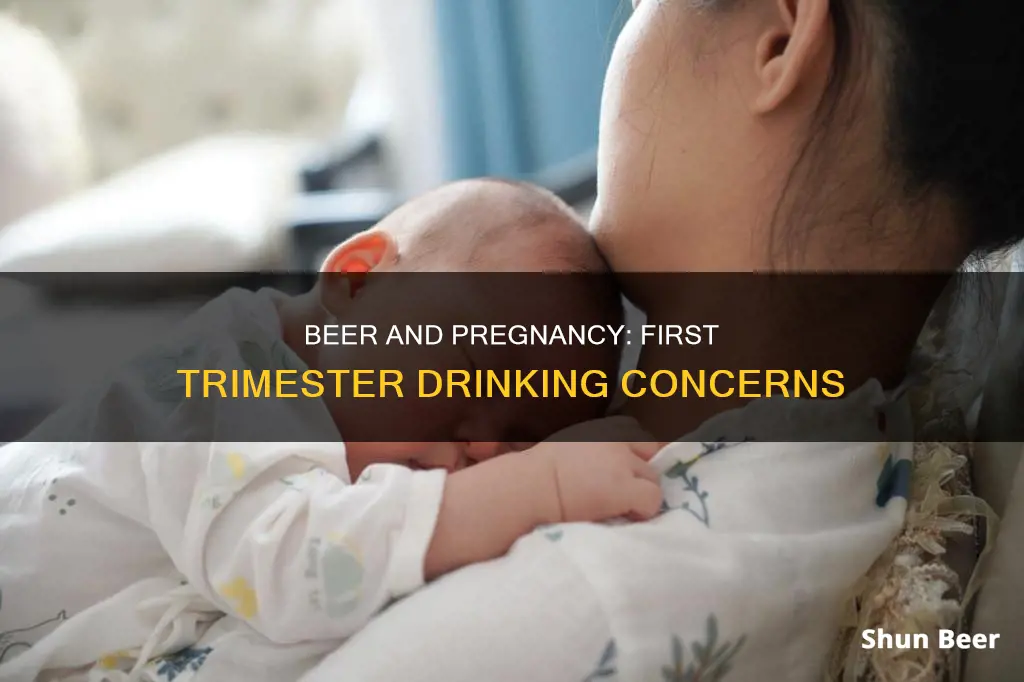
Drinking alcohol during pregnancy is a cause for concern for many women, especially in the first trimester, when the risk of miscarriage is at its highest. Official guidelines strongly advise against drinking any alcohol during pregnancy, as it can cause harm to the baby in the womb and lead to long-term medical problems and birth defects. Alcohol passes through the placenta to the baby, and their developing liver cannot process it. This can lead to an increased risk of miscarriage, premature birth, low birth weight, and a range of lifelong behavioural, intellectual, and physical disabilities known as fetal alcohol spectrum disorders (FASDs). However, some studies suggest that small amounts of alcohol in early pregnancy may not be as harmful as previously believed, and occasional drinking may not harm the mother or the baby. Ultimately, the safest option is to abstain from alcohol entirely during pregnancy.
| Characteristics | Values |
|---|---|
| Safety | No amount of alcohol is considered safe to drink during pregnancy. |
| Effects | Can lead to miscarriage, premature birth, low birth weight, fetal alcohol spectrum disorders, fetal alcohol syndrome, and stillbirth. |
| Recommendations | The NHS, CDC, ACOG, and other medical societies recommend that women should not consume alcohol during pregnancy. |
What You'll Learn
- Drinking beer in the first trimester can increase the risk of miscarriage
- Alcohol can cause long-term harm to the baby, including behavioural problems
- Drinking during pregnancy can cause fetal alcohol spectrum disorder (FASD)
- The baby's liver cannot process alcohol
- There is no known safe amount of alcohol during pregnancy

Drinking beer in the first trimester can increase the risk of miscarriage
Drinking alcohol during pregnancy is strongly advised against by official health organisations, including the NHS, the CDC, and the ACOG. This is because alcohol passes through the placenta to the baby, who does not have a fully developed liver and cannot process it. As such, drinking beer in the first trimester can increase the risk of miscarriage and cause serious harm to the baby's development.
The more you drink, the greater the risk to your baby. Binge drinking (5 or more drinks in one sitting) greatly increases the risk of alcohol-related damage to the baby, and heavy drinkers (those who consume more than 2 alcoholic beverages per day) are at a greater risk of giving birth to a child with fetal alcohol syndrome (FAS). FAS is a lifelong and irreversible condition that can cause stunted growth, a dysfunctional central nervous system, and specific facial abnormalities. It can also lead to learning disabilities, behavioural problems, and difficulties with attention and memory.
While some studies suggest that small amounts of alcohol in the first trimester may not increase the risk of certain complications, such as high blood pressure, premature birth, or low birth weight, the potential risks of drinking alcohol during pregnancy are still not fully understood. Some sources suggest that even light drinking can increase the risk of miscarriage, and that alcohol can interfere with healthy development and cause brain and birth defects.
Therefore, it is recommended that women who are pregnant or planning to become pregnant should avoid drinking any amount of alcohol, including beer, to keep the risk to their baby to a minimum.
Beer and Lipitor: Safe Mix or Health Risk?
You may want to see also

Alcohol can cause long-term harm to the baby, including behavioural problems
Drinking alcohol during pregnancy can cause long-term harm to the baby, including behavioural problems. This is known as fetal alcohol spectrum disorder (FASD). FASD is a wide range of physical, behavioural, and cognitive impairments that occur due to alcohol exposure before birth. These impairments may appear at any time during childhood and last a lifetime.
FASD can cause problems with learning and behaviour, as well as issues with joints, bones, muscles, and some organs. Children with FASD may have trouble managing their emotions and developing social skills, leading to hyperactivity and impulse control issues. They may also experience communication problems, such as speech difficulties.
Fetal Alcohol Syndrome (FAS) is the most severe condition within the group of disorders known as FASD. It is a permanent condition that happens when a pregnant person consumes any amount of alcohol during pregnancy. FAS can cause physical and mental defects, including stunted growth, a dysfunctional central nervous system, and a specific pattern of facial abnormalities.
Research has shown that binge drinking and heavy drinking during pregnancy put a developing baby at the greatest risk for severe problems. However, even lesser amounts can cause harm, and there is no known safe amount of alcohol consumption during pregnancy. The American Congress of Obstetricians and Gynecologists (ACOG) strongly urges women to refrain from drinking alcohol while pregnant.
Deep Cleaning: Beer Drinking Post-Procedure, Is It Safe?
You may want to see also

Drinking during pregnancy can cause fetal alcohol spectrum disorder (FASD)
Drinking alcohol during pregnancy can have adverse effects on the baby, and it is recommended that pregnant people or those planning to become pregnant abstain from alcohol to keep the risks to their baby at a minimum. Alcohol passes from the blood through the placenta to the baby and can seriously affect its development.
FASD can lead to lifelong challenges for individuals, including cognitive and behavioral impairments, as well as secondary disabilities such as medical, educational, mental health, and social challenges. It can also result in physical birth defects, including issues with the kidneys, skeleton, and heart, as well as vision and hearing problems.
The effects of FASD can vary, with some individuals experiencing only a few symptoms while others face more severe consequences. FASD is a preventable condition, and the best way to prevent it is to avoid drinking alcohol during pregnancy. If you are pregnant and drinking alcohol, it is essential to stop as soon as possible to lower the risk of FASD.
Beer Festivals: A Guide to the Frothy Fun
You may want to see also

The baby's liver cannot process alcohol
When a person drinks alcohol, it passes from their blood, through the placenta, and to the baby. An adult's liver is capable of breaking down alcohol, but a baby's developing liver is not. The baby's liver cannot process alcohol, and this can cause alcohol to reach and damage the baby's organs.
The baby's liver is not the only organ that can be affected by alcohol. The brain is also vulnerable, and even moderate amounts of alcohol can disturb its development. Some of the most severe problems happen when a pregnant person drinks in the first trimester, as this is when the baby's brain starts to develop. However, the second and third trimesters are not safe either, as the brain is still developing throughout the entire pregnancy.
Drinking alcohol during pregnancy can cause the baby to develop fetal alcohol spectrum disorder (FASD), a lifelong condition that can cause problems with learning, behaviour, joints, bones, muscles, some organs, managing emotions, developing social skills, hyperactivity, and impulse control. It can also lead to facial abnormalities, such as a small head, small eyes, and flattened cheekbones.
The effects of drinking alcohol during pregnancy can be severe and can put the baby at risk for a range of birth disorders, including fetal alcohol syndrome (FAS), which is the most severe form of FASD. FAS is characterised by stunted growth, a dysfunctional central nervous system, and specific facial abnormalities. It can also lead to premature birth and low birth weight, increasing the risk of miscarriage.
There is no known safe amount of alcohol that can be consumed during pregnancy. The best advice is for women to avoid alcohol entirely if they are pregnant or planning to become pregnant.
Do LCBO Gift Cards Work at Beer Store?
You may want to see also

There is no known safe amount of alcohol during pregnancy
Fetal Alcohol Syndrome (FAS) is among the spectrum of disorders that can be caused by drinking alcohol during pregnancy. FAS results in the baby having stunted growth, a dysfunctional central nervous system (which leads to neurobehavioral disorders), and a specific pattern of facial abnormalities. In the US, 40,000 babies are affected by FAS annually, and another 2 to 7 percent are affected by milder forms of cognitive impairment due to prenatal alcohol exposure.
The effects of drinking alcohol while pregnant, even in small amounts, can be severe and put the baby at risk for a range of birth disorders, known as Fetal Alcohol Spectrum Disorders (FASDs). These include physical, mental, behavioural, and learning disabilities that could have lifelong implications for the baby. According to the CDC, drinking alcohol during pregnancy can lead to developmental delays, hyperactive behaviour, intellectual disabilities, learning disabilities, speech and language delays, poor judgment skills, facial abnormalities, physical birth defects, vision and hearing problems, and sleep problems in infancy.
While some older studies suggested that light to moderate drinking could be beneficial for cardiovascular health, more recent research has called these findings into question. Alcohol is a toxic, psychoactive, and dependence-producing substance that has been classified as a Group 1 carcinogen. It causes at least seven types of cancer, including common types such as bowel and breast cancer. The risk of developing cancer increases substantially with the amount of alcohol consumed, but even "light" and "moderate" alcohol consumption can cause alcohol-attributable cancers.
Therefore, it is recommended that pregnant women or those planning to become pregnant should avoid alcohol completely to minimise any risks to the baby.
Drinking Alcohol-Free Beer: Is It Safe to Drive in the UK?
You may want to see also
Frequently asked questions
It is not recommended to drink beer or any other type of alcohol during the first trimester or any other stage of pregnancy. Alcohol consumption during pregnancy can lead to fetal alcohol spectrum disorders (FASDs) and fetal alcohol syndrome (FAS), which can cause lifelong harm to the baby.
Drinking beer or any other alcoholic beverage during the first trimester can increase the risk of miscarriage, premature birth, low birth weight, and fetal alcohol syndrome disorders (FASDs). Alcohol can affect the baby's growth, central nervous system, and facial development.
If you drank beer or any other alcoholic beverage before knowing you were pregnant, it is important to stop drinking alcohol immediately. The sooner you stop drinking, the healthier it will be for your baby. It is recommended to consult with a doctor or midwife to discuss any concerns and ensure proper prenatal care.







